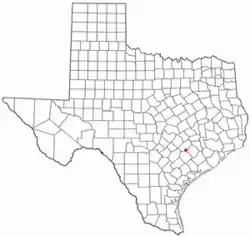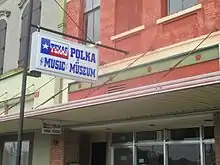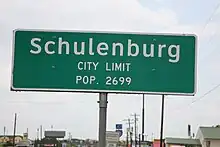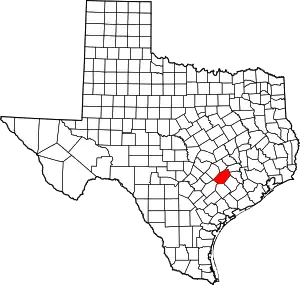Schulenburg, Texas
Schulenburg is a city in Fayette County, Texas, United States. Its population was 2,633 at the 2020 census.[4] Known for its German culture, Schulenburg is home of the Texas Polka Music Museum. It is in a rural, agricultural area settled by German and Czech emigrants in the 1800s.[5]
Schulenburg, Texas | |
|---|---|
 | |
| Motto: "Halfway to Everywhere" | |
 Location of Schulenburg, Texas | |
 | |
| Coordinates: 29°40′49″N 96°54′26″W | |
| Country | United States |
| State | Texas |
| County | Fayette |
| Incorporated | May 24, 1875 |
| Government | |
| • Mayor | Otto Kocian |
| • City council | Aldermen |
| • City manager | Tami Walker |
| Area | |
| • Total | 2.61 sq mi (6.77 km2) |
| • Land | 2.61 sq mi (6.77 km2) |
| • Water | 0.00 sq mi (0.00 km2) |
| Elevation | 367 ft (112 m) |
| Population (2020) | |
| • Total | 2,633 |
| • Density | 1,114.38/sq mi (430.29/km2) |
| Time zone | UTC-6 (Central (CST)) |
| • Summer (DST) | UTC-5 (CDT) |
| ZIP code | 78956 |
| Area code | 979 |
| FIPS code | 48-66188[2] |
| GNIS feature ID | 1346794[3] |
| Website | schulenburgtx |
History
In 1831, the Mexican government granted 4,428 acres (1,792 ha) of land to Kesiah Crier. Crier's family and the James Lyons family were the first European-American settlers in the area. The town of Schulenburg developed from two nearby communities: Lyons, founded in 1842, and High Hill, settled in 1842 and later named in 1858.
In 1873, the Galveston, Harris and San Antonio Railroad bought land in the area. They built a depot on the portion formerly owned by Louis Schulenburg, and named it after him.[6][7] The first train arrived on New Year's Eve of 1873, and the town was formally incorporated on May 24, 1875.

Many of the early settlers to Schulenburg and the surrounding area were immigrants of German, Austrian, and Czech descent, who came after the revolutions of 1848 in Europe. The area still shows evidence of their cultures.[6] For instance, local bakeries are noted for their kolaches, a Czech pastry.
Jewish immigrants also made Schulenburg their home, and many of them became merchants. Initially from Germany in the mid-19th century, they were later joined by immigrants from Eastern Europe.[8]
The town is the home of Stanzel Flying Models, makers of wire-controlled and free-flight model airplanes for nearly 70 years. Schulenburg is also home to Shaller Go-Karts manufacturing, for use in many tracks around the country.[9]
Geography
Schulenburg is located in southern Fayette County at 29°40′49″N 96°54′26″W (29.680320, –96.907138),[10] on high ground 2 miles (3 km) east of the Navidad River. It is about 95 miles west of Houston, Texas and 100 miles east of San Antonio.
According to the United States Census Bureau, Schulenburg has a total area of 2.5 square miles (6.5 km2), all of it land.[4]
Demographics
| Race | Number | Percentage |
|---|---|---|
| White (NH) | 1,406 | 53.4% |
| Black or African American (NH) | 379 | 14.39% |
| Native American or Alaska Native (NH) | 3 | 0.11% |
| Asian (NH) | 16 | 0.61% |
| Some other race (NH) | 10 | 0.38% |
| Mixed/multiracial (NH) | 43 | 1.63% |
| Hispanic or Latino | 776 | 29.47% |
| Total | 2,633 |
As of the 2020 United States census, 2,633 people, 964 households, and 600 families resided in the city.
As of the census[2] of 2000, 2,699 people, 1,052 households, and 655 families lived in the city. The population density was 427.1/km2 (1,107.8/mi2). The 1,226 housing units had an average density of 194.0/km2 (503.2/mi2). The racial makeup of the city was 76.29% White, 15.45% African American, 0.30% Native American, 0.33% Asian, 6.08% from other races, and 1.56% from two or more races. Hispanics or Latinos of any race were 13.56% of the population.
Of the 1,052 households, 26.8% had children under 18 living with them, 46.9% were married couples living together, 11.6% had a female householder with no husband present, and 37.7% were not families. About 34.3% of all households were made up of individuals, and 20.7% had someone living alone who was 65 or older. The average household size was 2.32, and the average family size was 2.96.
In the city, the age distribution was 21.7% under 18, 6.6% from 18 to 24, 23.0% from 25 to 44, 21.1% from 45 to 64, and 27.6% who were 65 or older. The median age was 44 years. For every 100 females, there were 82.0 males. For every 100 females 18 and over, there were 76.0 males.
The median income for a household in the city was $27,619, and for a family was $36,326. Males had a median income of $26,111 versus $20,549 for females. The per capita income for the city was $15,784. About 6.9% of families and 12.5% of the population were below the poverty line, including 13.6% of those under age 18 and 13.5% of those age 65 or over.
Climate
| Climate data for Muldoon, Texas | |||||||||||||
|---|---|---|---|---|---|---|---|---|---|---|---|---|---|
| Month | Jan | Feb | Mar | Apr | May | Jun | Jul | Aug | Sep | Oct | Nov | Dec | Year |
| Record high °F (°C) | 90 (32) |
99 (37) |
98 (37) |
100 (38) |
103 (39) |
107 (42) |
110 (43) |
111 (44) |
108 (42) |
102 (39) |
92 (33) |
95 (35) |
111 (44) |
| Average high °F (°C) | 61 (16) |
65 (18) |
71 (22) |
78 (26) |
84 (29) |
90 (32) |
93 (34) |
95 (35) |
89 (32) |
81 (27) |
71 (22) |
62 (17) |
78 (26) |
| Average low °F (°C) | 42 (6) |
45 (7) |
51 (11) |
60 (16) |
67 (19) |
73 (23) |
74 (23) |
74 (23) |
70 (21) |
62 (17) |
52 (11) |
44 (7) |
60 (15) |
| Record low °F (°C) | 4 (−16) |
12 (−11) |
14 (−10) |
30 (−1) |
43 (6) |
50 (10) |
57 (14) |
57 (14) |
41 (5) |
27 (−3) |
19 (−7) |
3 (−16) |
3 (−16) |
| Average precipitation inches (mm) | 2.47 (63) |
2.46 (62) |
2.76 (70) |
2.47 (63) |
4.42 (112) |
4.30 (109) |
2.35 (60) |
2.54 (65) |
3.45 (88) |
4.49 (114) |
3.45 (88) |
2.61 (66) |
37.77 (959) |
| Source: weather.com[14] | |||||||||||||
| Census | Pop. | Note | %± |
|---|---|---|---|
| 1880 | 719 | — | |
| 1890 | 816 | 13.5% | |
| 1900 | 1,149 | 40.8% | |
| 1910 | 1,091 | −5.0% | |
| 1920 | 1,246 | 14.2% | |
| 1930 | 1,604 | 28.7% | |
| 1940 | 1,970 | 22.8% | |
| 1950 | 2,005 | 1.8% | |
| 1960 | 2,207 | 10.1% | |
| 1970 | 2,294 | 3.9% | |
| 1980 | 2,469 | 7.6% | |
| 1990 | 2,455 | −0.6% | |
| 2000 | 2,699 | 9.9% | |
| 2010 | 2,852 | 5.7% | |
| 2020 | 2,633 | −7.7% | |
| U.S. Decennial Census[15] | |||
Education
The city is served by the Schulenburg Independent School District and is home to the Schulenburg Shorthorns. St. Rose of Lima Catholic School (prekindergarten through grade 8) operates under the guidance of the Diocese of Victoria. Other educational institutions include a campus of Blinn College, a public junior college.
Media
Schulenburg is served by one local newspaper, The Schulenburg Sticker, which was founded by German immigrant Ernst Goeth and has been in continuous publication since 1894.[16]
Transportation and Infrastructure
Schulenburg is located at the general convergence of three major US highways: Interstate 10, U.S. Route 90, and U.S. Route 77. The two US routes form the central intersection of the street, and I-10 flows just north of the city center.
Air travel to Schulenburg is sparse. No general aviation airports exist within five miles of the city center, and the closest major commercial airports are Austin International, San Antonio International, and the two Houston airports (Hobby International and Bush Intercontinental).
Notable people
- Willis Adams, former wide receiver for the Cleveland Browns of the National Football League (NFL)
- Hugo Hollas, former NFL player for the New Orleans Saints and San Francisco 49ers
- E. J. Holub, former NFL player for the Kansas City Chiefs.
- Lora Lee Michel (born 1940), American child actor
- Joe Mikulik, minor league baseball manager and player
 Texas Polka Music Museum in Schulenburg
Texas Polka Music Museum in Schulenburg Schulenburg Chamber of Commerce
Schulenburg Chamber of Commerce Schulenburg city limits
Schulenburg city limits Mulberry Creek Bridge
Mulberry Creek Bridge
References
- "2019 U.S. Gazetteer Files". United States Census Bureau. Retrieved August 7, 2020.
- "U.S. Census website". United States Census Bureau. Retrieved January 31, 2008.
- "US Board on Geographic Names". United States Geological Survey. October 25, 2007. Retrieved January 31, 2008.
- "Geographic Identifiers: 2010 Demographic Profile Data (G001): Schulenburg city, Texas". U.S. Census Bureau, American Factfinder. Retrieved August 25, 2016.
- "TSHA | Fayetteville, TX (Fayette County)".
- "Schulenburg, Texas". Texas State Historical Association. Retrieved August 2, 2012.
- "Profile for Schulenburg, Texas, TX". ePodunk. Retrieved August 2, 2012.
- "Tri-County Jewish Community: Columbus, Hallettsville, La Grange, Schulenburg" Archived 2012-06-14 at the Wayback Machine, found in the Encyclopedia of Southern Jewish Communities,
- https://www.shaller.com/
- "US Gazetteer files: 2010, 2000, and 1990". United States Census Bureau. February 12, 2011. Retrieved April 23, 2011.
- "Explore Census Data". data.census.gov. Retrieved May 25, 2022.
- http://www.census.gov
- "About the Hispanic Population and its Origin". www.census.gov. Retrieved May 18, 2022.
- "Monthly Averages for Muldoon, TX". Retrieved September 10, 2009.
- "Census of Population and Housing". Census.gov. Retrieved June 4, 2015.
- "About The Schulenburg Sticker". The Schulenburger Sticker. Retrieved August 2, 2012.
